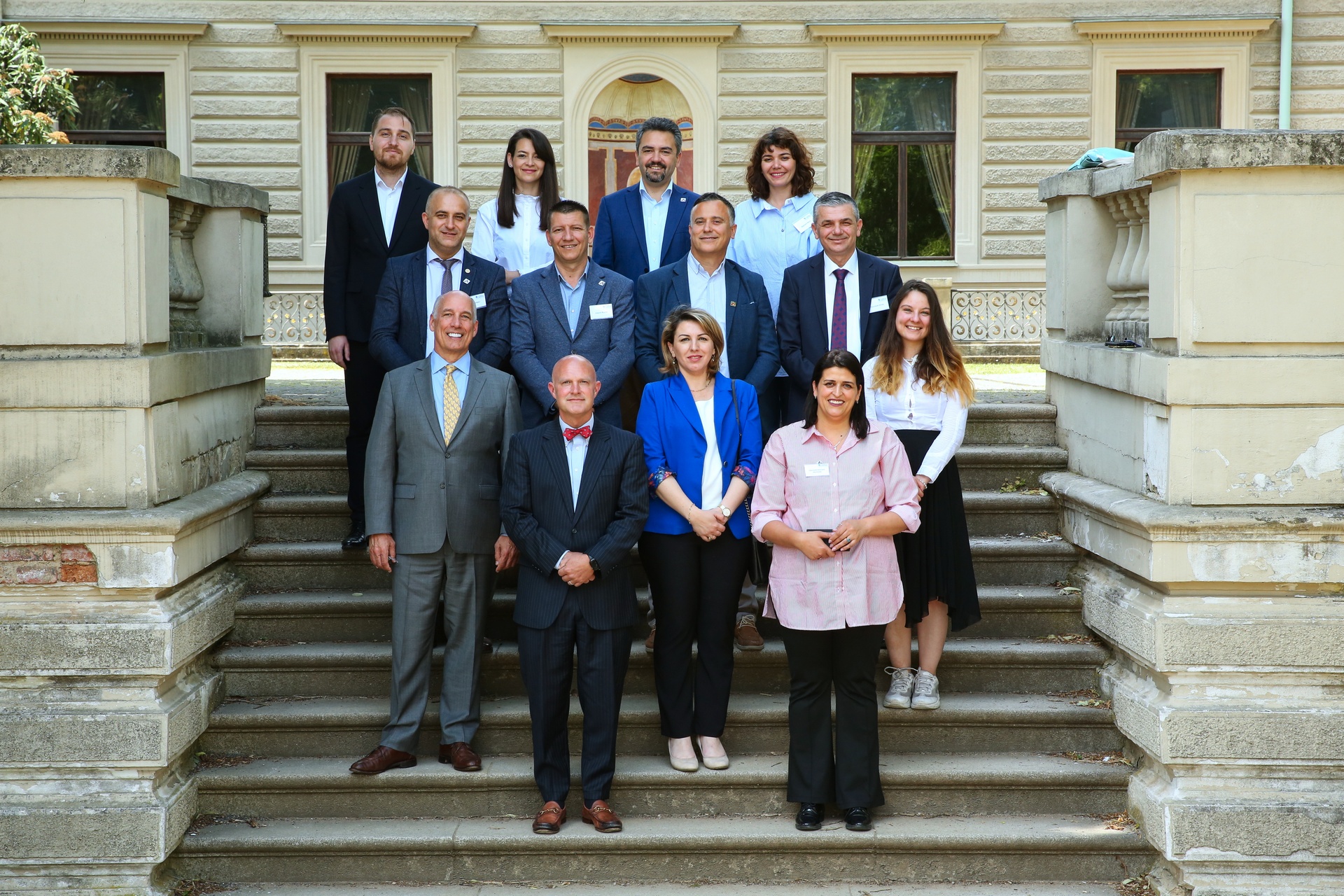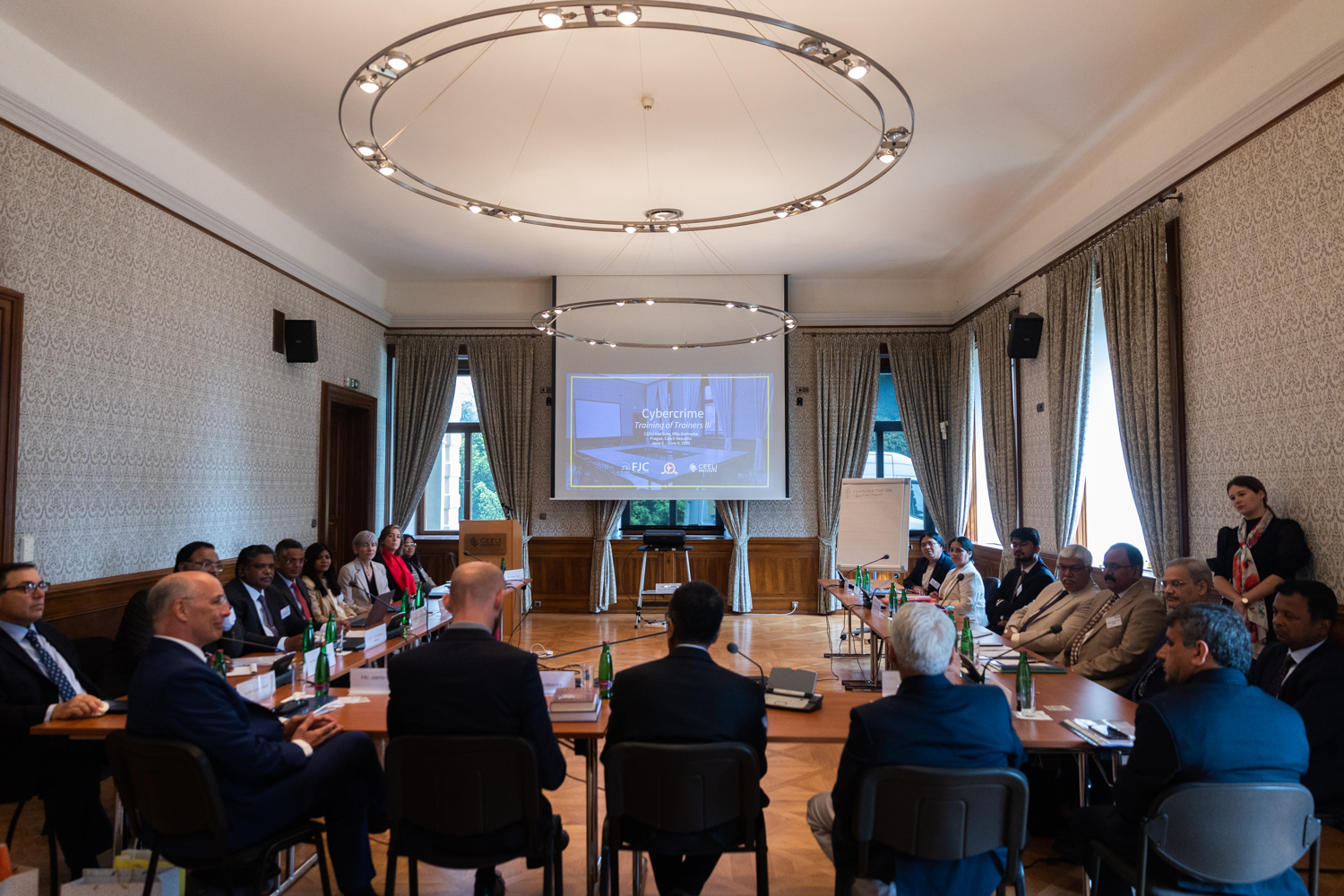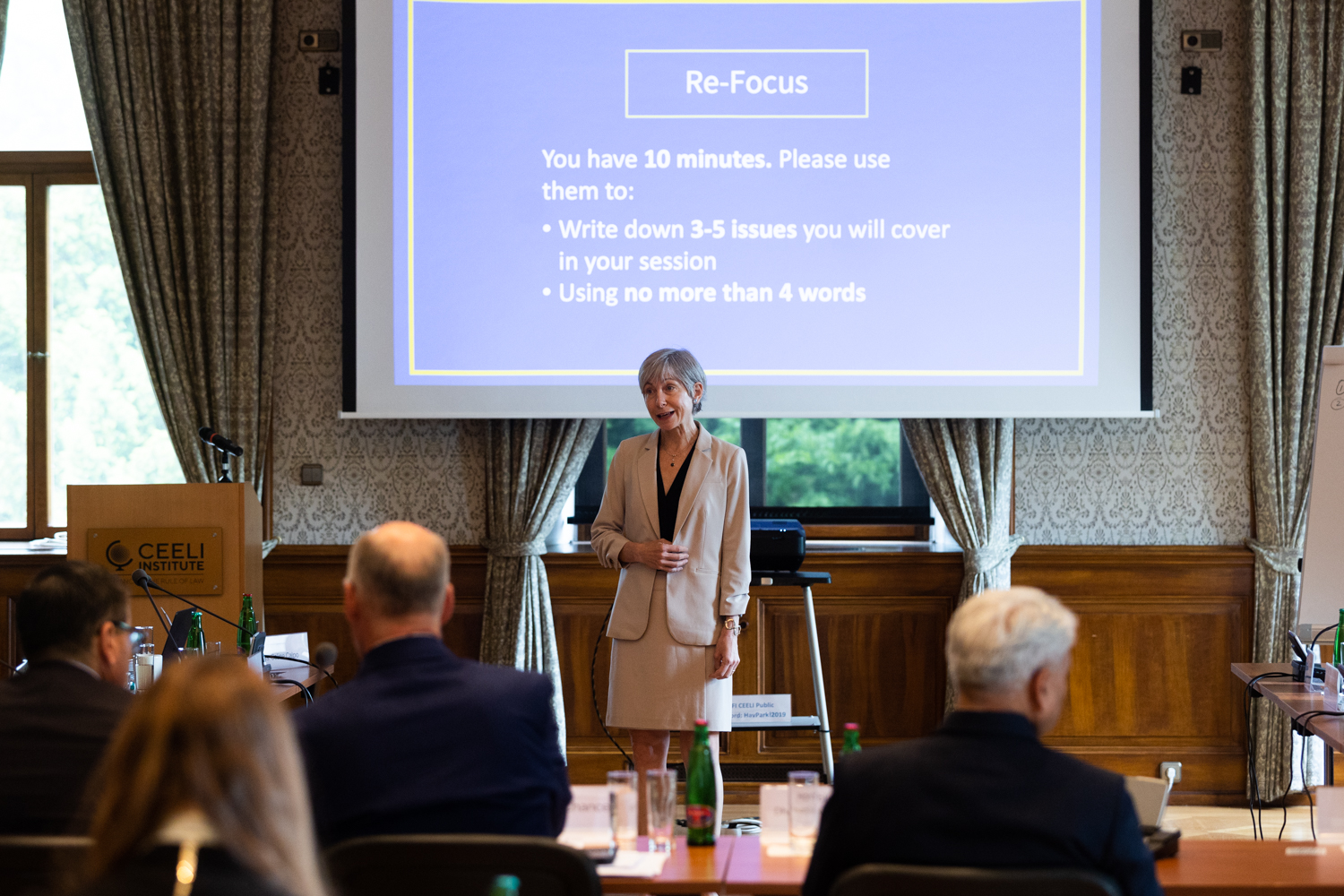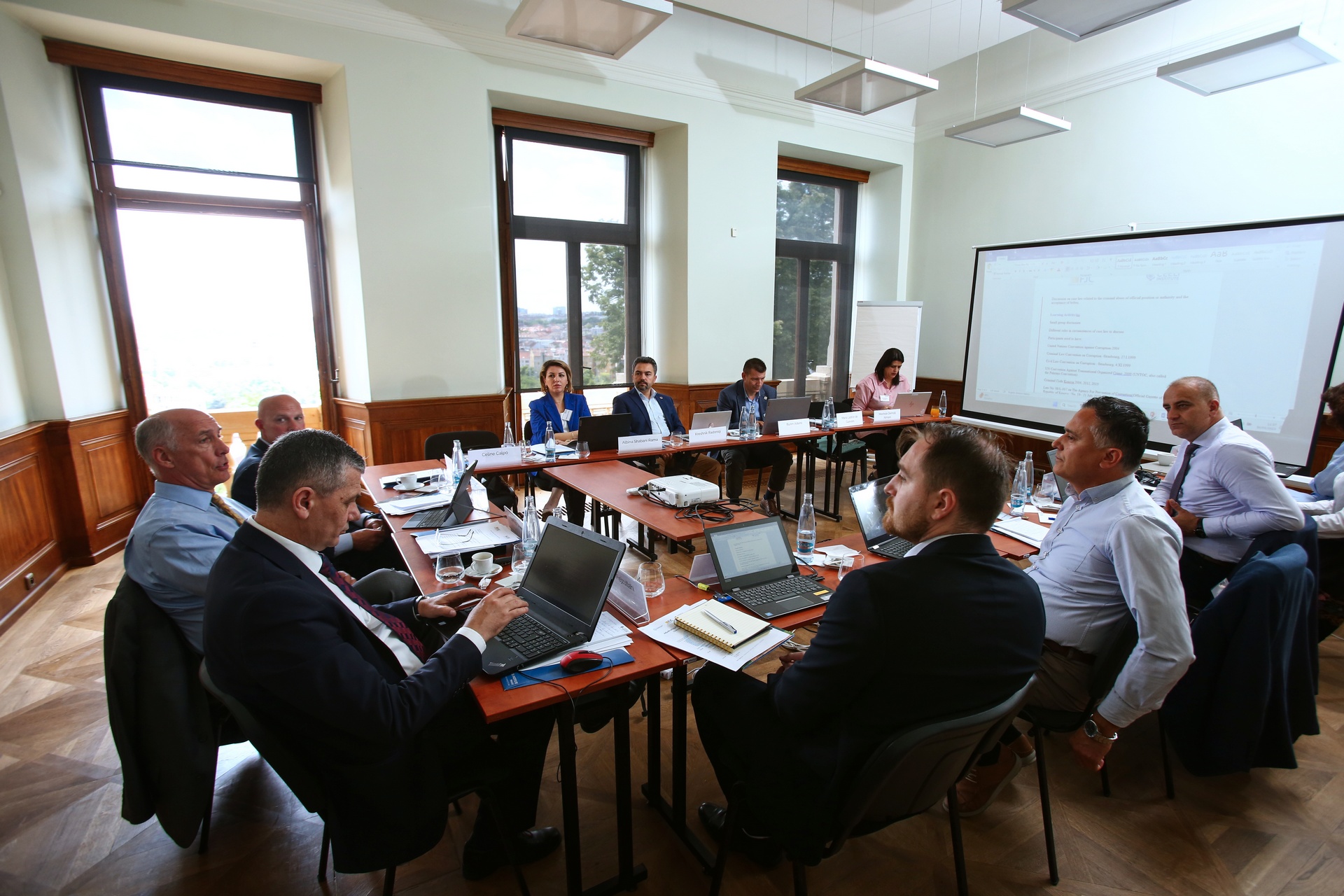The Master Trainers
What do human trafficking cases in India and public corruption cases in Kosovo have in common? Judges and justices that preside over each area enjoyed pumpkin soup at the CEELI Institute on Wednesday. This past weekend, two American judges, two educational experts, eight Indian judges and high court justices, and seven judges from Kosovo all arrived at the best hotel in Praha, Villa Grebövka. In the mornings, they mosey down the Italian Renaissance halls following the smell of the chef’s cuisine or hop into the Villa’s gym for a morning workout before their faculty development program begins. Their business cards may say “Justice” or “Director,” but within the CEELI team, we refer to them as “Master Trainers.” This week, I got to see why.
The CEELI Institute orchestrates faculty development programs, or, as my colleagues describe it, “training the master trainers.” The Institute arranges for highly reputable judges and justices from one of our partner countries to convene with professional adult educators and international judges. Together, they develop a curriculum within an area of law. For our guests this week, the Indian judicial members were focused on human trafficking and trauma-informed judging, and the Kosovan master trainers tackled adjudicating corruption cases. After weeks of all-day presentations, exercises, and lectures, the group emerges with a finished product: a carefully curated workshop on the rule of law. The justices and judges return to their country and train their colleagues on navigating the complex legal area. Ideally, the attendees of the master trainers’ workshops pass their insights onto their judicial network, and the chain of knowledge continues to expand. It’s a self-replicating educational system on a particular legal area of need within a country, and it starts here. This is how the CEELI Institute advances the rule of law.
 Monday morning, I made my way into the Indian master trainers’ arena, our grand event space on the main floor. Taking a seat beside Natalie, my dear friend and Czech colleague, I prepared for what lay ahead. After shyly introducing myself to the justices and judges, I leaned over and asked Natalie how one trains a master trainer. She filled me in on the strategy. The program’s objective is to create a workshop that the Indian judiciary members can use to train other judges on navigating the issues and common pitfalls of human trafficking cases in India. They divided the overarching topic into smaller themes, such as the treatment of victims during a trial, and each master trainer created a lesson on a specific area. Natalie quietly described how the esteemed professionals in the room had been taught presentation and facilitation skills over the last few months, and now they were finalizing the curriculum and performing a pilot workshop. In front of us, I heard one of the educators say, “During the presentation, you need to ask yourself, “is what I’m presenting going to help a judge better handle a human trafficking case?” The first justice was already at the lectern, his PowerPoint displayed “Trauma Informed-Judging,” hypotheticals were passed around, and his colleagues assumed their role as pupils. The master trainer began.
Monday morning, I made my way into the Indian master trainers’ arena, our grand event space on the main floor. Taking a seat beside Natalie, my dear friend and Czech colleague, I prepared for what lay ahead. After shyly introducing myself to the justices and judges, I leaned over and asked Natalie how one trains a master trainer. She filled me in on the strategy. The program’s objective is to create a workshop that the Indian judiciary members can use to train other judges on navigating the issues and common pitfalls of human trafficking cases in India. They divided the overarching topic into smaller themes, such as the treatment of victims during a trial, and each master trainer created a lesson on a specific area. Natalie quietly described how the esteemed professionals in the room had been taught presentation and facilitation skills over the last few months, and now they were finalizing the curriculum and performing a pilot workshop. In front of us, I heard one of the educators say, “During the presentation, you need to ask yourself, “is what I’m presenting going to help a judge better handle a human trafficking case?” The first justice was already at the lectern, his PowerPoint displayed “Trauma Informed-Judging,” hypotheticals were passed around, and his colleagues assumed their role as pupils. The master trainer began.


I learned a lot from the seasoned judicial members during their presentations and the critical discussions afterward. An example of a common scam in India involves individuals posing as travel agents and offering citizens lucrative employment opportunities in the US. After uprooting their lives, the victims discover that the job is a sham. To make things worse, the travel agent gives them fake travel documents, so they can’t use their passports. Stuck in a foreign country without the ability to go back to India, the victims are forced to work in this improper job to survive. This currently happens in the US. During discussions about human trafficking, the master trainers shared cases they had worked on, where traumatized witnesses weren’t questioned properly, and truth never came to light. One justice had created a vulnerable witness deposition chamber in her own office, another routinely asked a victim’s family what he or she is interested in to make them comfortable in the courtroom. They got involved, and I could see their frustration in describing how the justice system had failed survivors of human trafficking.
Throughout the week, I noticed differences in the training of the trainers. The Indian justices were highly expressive, frequently engaging in philosophical discourse. What is the difference between a trauma-informed judge and a trauma-informed court? Regarding the dark web, the right to be forgotten differs from the right of complete erasure because it involves a person’s mind. But how do you remove something from the mind? I wanted to protest when the educational professionals reeled the master trainers’ intellectual curiosity back. The Kosovan master trainers were more reserved, but if one started speaking in Albanian, the others would immediately follow suit, and the educational professionals would hurriedly turn to my colleague, Arlind, who would do his best to translate the conversation. We committed a faux pas with the Kosovan master trainers on Monday and had them in the arena from 9:30 am until 12:00 pm. In our defense, we didn’t know they had a customary practice of taking short coffee breaks every hour. The schedule was adjusted to include more recesses, and the dialogue immediately became more fruitful. But I don’t think they ever forgave us for that Monday morning session.
 On Friday, the next “training of the master trainers” was set on everyone’s calendars. I was honored when the Kosovan judges requested that the CEELI team bring me to Kosovo for the workshop in September. Apparently, they thought I played a special part in lifting the content off the ground. The Executive Director of the Kosovo Academy of Justice and I became good friends, and he’d coincidentally worked on drafting Kosovo’s Constitution with Professor Warren. We bonded over stories of his favourite intern, a William & Mary Law student named Ryan, whom he’s stayed in touch with for over 15 years. When I showed him the law school’s current international internship program, he was thrilled to discover that Professor Warren’s unique global law school experience was still ongoing. He graciously extended an open offer to work for him in Kosovo, and I asked if he’d like to re-establish an internship program, assuring him that the caliber of William & Mary students is just as exceptional as when Ryan interned for him. He smiled at me, said he knows, and gave me a lovely message for Professor Warren. It was the beginning of a budding international law opportunity and a wonderful ending to the week.
On Friday, the next “training of the master trainers” was set on everyone’s calendars. I was honored when the Kosovan judges requested that the CEELI team bring me to Kosovo for the workshop in September. Apparently, they thought I played a special part in lifting the content off the ground. The Executive Director of the Kosovo Academy of Justice and I became good friends, and he’d coincidentally worked on drafting Kosovo’s Constitution with Professor Warren. We bonded over stories of his favourite intern, a William & Mary Law student named Ryan, whom he’s stayed in touch with for over 15 years. When I showed him the law school’s current international internship program, he was thrilled to discover that Professor Warren’s unique global law school experience was still ongoing. He graciously extended an open offer to work for him in Kosovo, and I asked if he’d like to re-establish an internship program, assuring him that the caliber of William & Mary students is just as exceptional as when Ryan interned for him. He smiled at me, said he knows, and gave me a lovely message for Professor Warren. It was the beginning of a budding international law opportunity and a wonderful ending to the week.